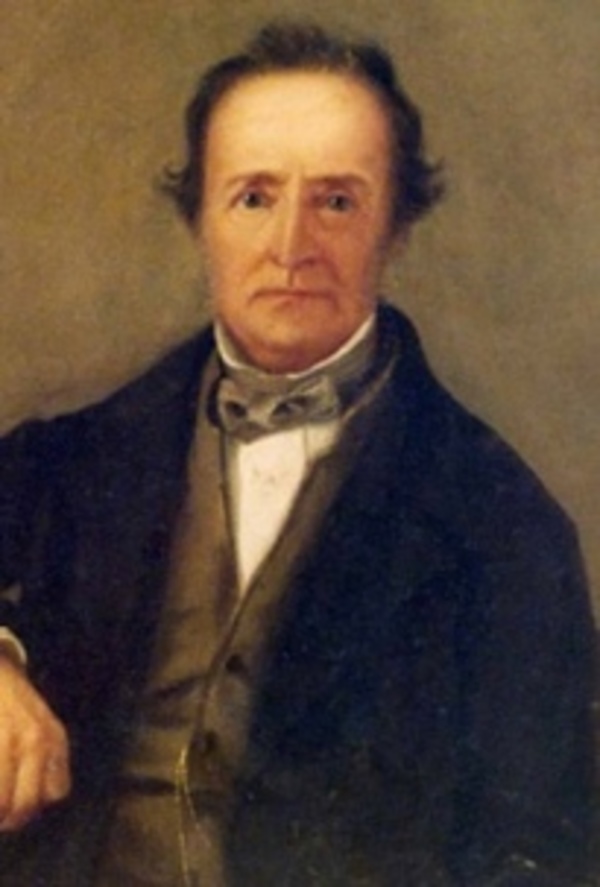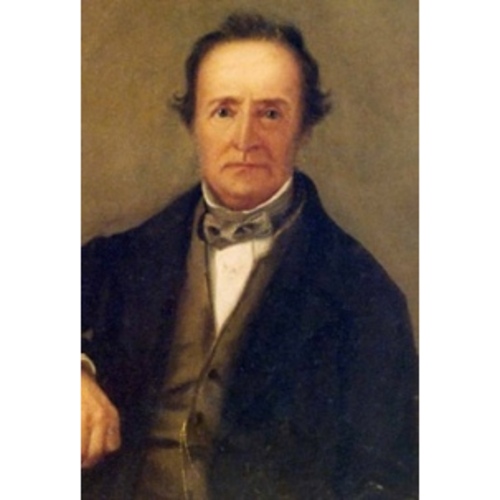
Source: Link
BOULTON, GEORGE STRANGE, lawyer, militia officer, public servant, and politician; b. 11 Sept. 1797 at Greenbush, near Albany, N.Y., third son of D’Arcy Boulton* and Elizabeth Forster; m. in 1824 Elizabeth Boulton (d. 1836) by whom he had three children, and in 1840 Anna Maria Berk, née Walton, of Schenectady, N.Y.; d. 13 Feb. 1869 at Cobourg, Ont.
The Boulton family came to Upper Canada about 1800 and George Strange Boulton attended John Strachan’s School at Cornwall. When the family settled in York (Toronto) about 1807, he was one of the first pupils enrolled at the Home District Grammar School of the Reverend George Okill Stuart. He was admitted to the bar in 1818 and began practice in Port Hope. About 1824 Boulton moved to Cobourg upon his appointment as registrar of Durham County, a post he held until his death.
Boulton had served during the War of 1812, at the age of 15, and at the outbreak of the rebellion in 1837 he hastened to Toronto to offer his services as a militia officer to Sir Francis Bond Head*. For many years he was colonel of the 4th militia district of Upper Canada.
In politics George Boulton was described as “remarkable for his adherence to the conservative cause – which he never once failed to uphold to the day of his death.” He was first elected to the House of Assembly for Durham in 1824, but his election was declared void in 1825 and he did not contest the subsequent by-election. Boulton was successful in his second attempt to enter the assembly, in 1830, and continued to represent Durham until 1841. During the election of that year one of the supporters of his successful opponent, John Tucker Williams, was killed. Boulton denied that he had “hired Bullies or Loafers,” declaring that Williams’ supporters had come to the polls armed and his own supporters had taken up sticks in self-defence. Yet Boulton, a kindly man who was noted for his benevolence, especially to the poor, arranged a subscription for the family of the man killed.
In the assembly, Boulton supported his brother, Attorney General Henry John Boulton, in voting for the expulsions in the early 1830s of William Lyon Mackenzie, and continued to vote against Mackenzie even after his brother was dismissed as attorney general over the issue. In 1834 Boulton opposed a clause in the bill to incorporate the town of York which proposed voting by secret ballot in municipal elections. Largely because of his speech the “vote by ballot,” which he considered “a mean and despicable mode of voting . . . that tended to encourage deception . . . falsehood and misrepresentation,” was rejected by the assembly.
In June 1847 Boulton was appointed to the Legislative Council. A member until confederation, he took his duties in the council seriously and spoke with effect on a subject when strongly moved. During debate on amendments to the Land Act in 1847, Boulton supported Robert Baldwin Sullivan*’s proposal to make available low-priced or free lands to encourage settlement by immigrants.
A devoted member of the Church of England and a member of the Church Society from its inception in 1843, Boulton was also a commissioner of the Cobourg Town Trust from 1858 until his death. Secure socially and financially, he took his private and public position as his due. Unlike his elder brother, Henry John, George Boulton excited neither envy nor fear. He could be a forceful and influential debater, but he seems to have attended to his parliamentary duties more in the sense of noblesse oblige than from any motive of personal ambition or gain.
Colonial Advocate, 1824–25. Globe, 20 Feb. 1869. Toronto Patriot, 1833–34, 1841, 1847, 3 March 1869. J. R. Robertson, Old Toronto: a selection of excerpts from “Landmarks of Toronto,” ed. E. C. Kyte (Toronto, 1954), 307. U.C., House of Assembly, Journal, 7 Jan. 1831. Armstrong, Handbook of Upper Canadian chronology, 81, 124. CPC, 1862. Political appointments, 1841–65 (J.-O. Coté), 55. Wallace, Macmillan dictionary, 73.
Cite This Article
Hereward Senior, “BOULTON, GEORGE STRANGE,” in Dictionary of Canadian Biography, vol. 9, University of Toronto/Université Laval, 2003–, accessed March 1, 2026, https://www.biographi.ca/en/bio/boulton_george_strange_9E.html.
The citation above shows the format for footnotes and endnotes according to the Chicago manual of style (16th edition). Information to be used in other citation formats:
| Permalink: | https://www.biographi.ca/en/bio/boulton_george_strange_9E.html |
| Author of Article: | Hereward Senior |
| Title of Article: | BOULTON, GEORGE STRANGE |
| Publication Name: | Dictionary of Canadian Biography, vol. 9 |
| Publisher: | University of Toronto/Université Laval |
| Year of publication: | 1976 |
| Year of revision: | 1976 |
| Access Date: | March 1, 2026 |



